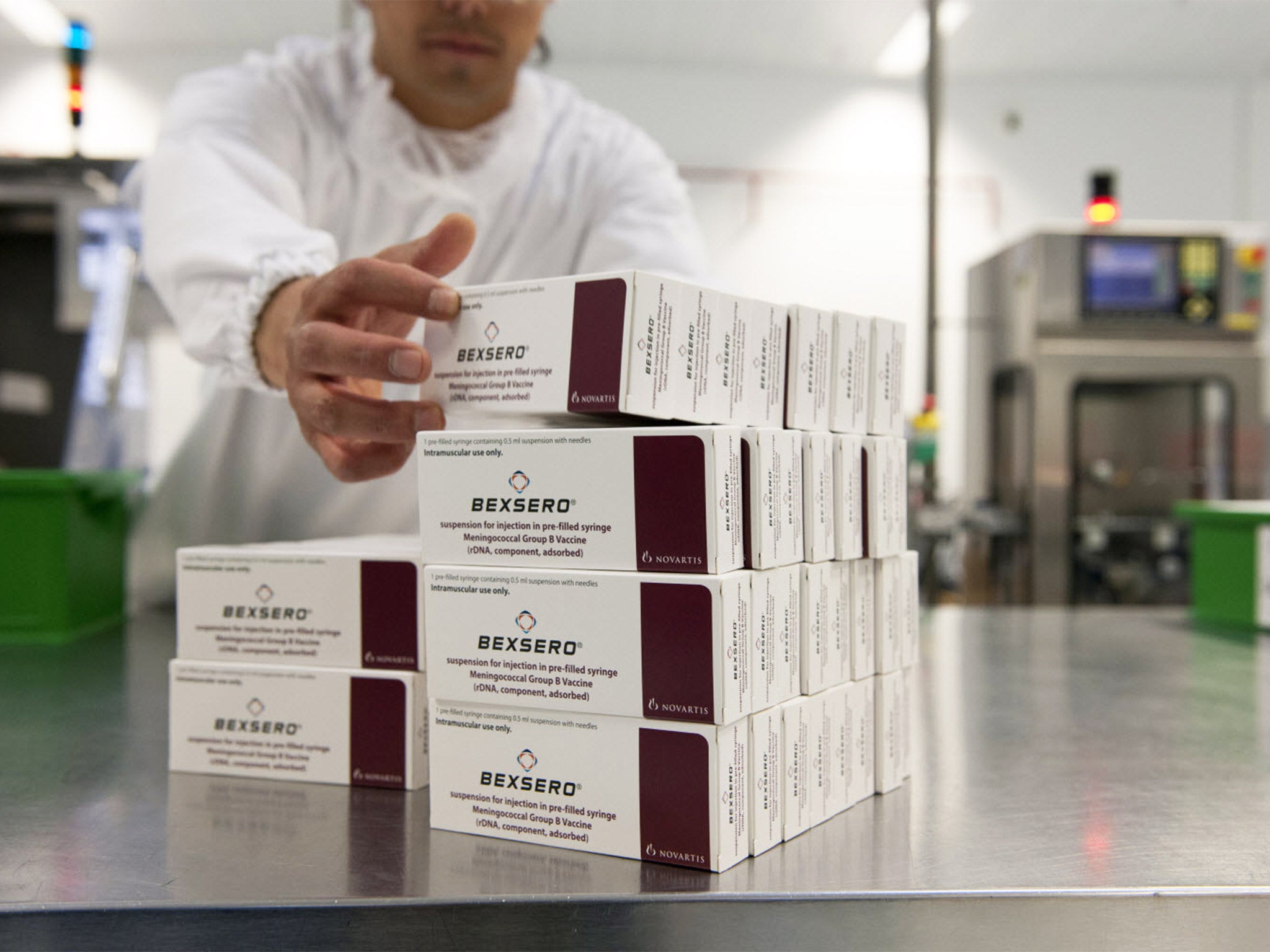Wrangling over life-saving meningitis vaccine may cost 'hundreds of children’s lives'
Exclusive: Department of Health accuses Swiss drug company of 'holding the Government to ransom'

Your support helps us to tell the story
From reproductive rights to climate change to Big Tech, The Independent is on the ground when the story is developing. Whether it's investigating the financials of Elon Musk's pro-Trump PAC or producing our latest documentary, 'The A Word', which shines a light on the American women fighting for reproductive rights, we know how important it is to parse out the facts from the messaging.
At such a critical moment in US history, we need reporters on the ground. Your donation allows us to keep sending journalists to speak to both sides of the story.
The Independent is trusted by Americans across the entire political spectrum. And unlike many other quality news outlets, we choose not to lock Americans out of our reporting and analysis with paywalls. We believe quality journalism should be available to everyone, paid for by those who can afford it.
Your support makes all the difference.Jeremy Hunt is under severe pressure from the Prime Minister to explain why his department has failed to agree a deal with the makers of a new life-saving meningitis vaccine.
The stalled talks between the Department of Health and the Swiss multinational Novartis mean months of delay in bringing the vaccine into the NHS’s child-immunisation programme. This could result in hundreds of children losing their lives or facing traumatic limb amputations. Today the Health Secretary’s team offered its account of the failure to make the vaccine available on the NHS, accusing the Swiss drug company of “holding the Government to ransom”. They said it was “seeking to turn a profit” which could not be accepted “because this would deny treatments to other patients”.
Novartis’s head of vaccines, Dr Andrin Oswald, rejected the accusation, insisting his company had “gone to great lengths to support a swift implementation of a vaccination campaign”.
Mr Hunt’s advisers ended months of near silence on the Department of Health’s talks with Novartis when meningitis research groups were told this week that the process involved “difficult negotiations to agree a cost-effective price”. Only a handful of formal discussions over the last three months have taken place.
A letter to the Meningitis Research Foundation by Mr Hunt’s special adviser, Ed Jones, sought to distance the Department of Health from any failure by insisting there was “certainly no lack of ministerial will to maintain momentum”.
However, the Department failed to mention concessions that Novartis has offered during the negotiations. The Independent has been told that the first million doses of the Bexsero vaccine were offered to the Department of Health for free in an effort to “ensure a rapid start to a vaccination campaign for 2014”. The Department said it would not comment on the offer of one million free vaccines.
Although health officials insisted there was “momentum” in the negotiations, department insiders are saying the discussions with Novartis are “deadlocked – stalled”. They add that, if the lack of agreement continues, it will threaten not only this winter’s peak of meningitis B infection in children, but the 2015 season could also be missed.

The lack of progress by Mr Hunt’s department is said to have shocked 10 Downing Street when David Cameron learnt that, once again, the Government’s record on promises for the NHS was under threat.
The Independent understands that the Prime Minister has asked for a detailed update on how the Novartis deal could be fast-tracked to a successful conclusion. The political fallout from the deadlocked talks will be serious because of the high level of sales of the meningitis B vaccine in the private sector. Wealthy parents with two children are currently able to obtain private immunisation by paying more than £1,000.
The mapping of private sales of the vaccine shows little uptake in the UK’s poorer areas, where the vaccine is most needed.
The Meningitis Research Foundation has been urging Mr Hunt to “break the deadlock” over the vaccine's introduction. Sue Davie, the chief executive of the Meningitis Now pressure group, said: “It is now almost nine months since the JCVI [Joint Committee on Vaccination and Immunisation] made their recommendation for the introduction of the meningitis B vaccine for babies, and it is three and half months since we were told negotiations had started.
“As a charity CEO, I totally understand the need to balance the books. But how long can it take two parties to negotiate on one product, especially when that product will save lives and prevent disability?”
The medical charity Meningitis Now wrote to the deputy chief medical officer last month. They told Professor John Watson that “no information” had been offered on the Department’s discussions with Novartis. The charity’s letter said, “We can only assume that negotiations are either not progressing or have broken down.”
There have been more than 1,000 cases of meningitis B since the vaccine was licensed in the UK last year. It is estimated that as many as 100 of these cases will have resulted in death, with another 300 affected by disability. The Department of Health said an “expert independent committee” had set a “cost-effective price for the vaccine and that the Government was determined to introduce it. “Negotiations,” the department said, “are continuing.”
Join our commenting forum
Join thought-provoking conversations, follow other Independent readers and see their replies
Comments